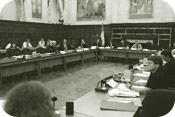Committees: Examining Bills and Issues in Depth
Standing Committees of the House of Commons for the
38th Parliament
Aboriginal Affairs and Northern Development
Access to Information, Privacy and Ethics
Agriculture and Agri-Food
Canadian Heritage
Citizenship and Immigration
Environment and Sustainable Development
Finance
Fisheries and Oceans
Foreign Affairs and International Trade
Government Operations and Estimates
Health
Human Resources, Skills Development, Social
Development and the Status of Persons with
Disabilities
Industry, Natural Resources, Science and
Technology
Justice, Human Rights, Public Safety and Emergency
Preparedness
National Defence and Veterans Affairs
Official Languages
Procedure and House Affairs
Public Accounts
Status of Women
Transport
Standing Joint Committees
Library of Parliament
Scrutiny of Regulations
Committee Statistics 2005-2006
Total number of meetings: 941
Total number of sitting hours: 1,597
Total number of witnesses: 3,585
Total number of reports: 159

House of Commons committees study issues and bills in
depth, often calling on the expertise of witnesses from
the public and private sectors.
Photo: © C. Diotte
Committee work makes up an important part of Members'
activities. In committee, they study and amend bills, and
examine departmental spending plans.
Committees may also initiate their own inquiries and
explore issues referred by the House relating to areas of
public policy including defence, health and finance.
Members may call on interested parties to submit briefs,
and they may have to travel across Canada or abroad to
hear from individuals and groups who have an interest in
the subject under study. For example, the
Standing Committee on Canadian Heritage, as part of
its study of the Canadian feature film industry,
travelled to Vancouver, Winnipeg, Toronto, Montréal and
Halifax to hold hearings and conduct site visits. The
Standing Committee on Procedure and House Affairs
travelled to several countries in order to examine
electoral reform. At the conclusion of a study, the
committee presents a report to the House with its views
and recommendations. Committee work can involve, on
average, four meetings or eight hours a week of sittings
per Member.
Committees offer Canadians a close-up look at the work of
Members and the role of Parliament, and provide an
opportunity for public input. The Parliament
of Canada Web site features committee schedules and
contact information. ParlVU, a live Webcast service,
carries televised House of Commons committee meetings and
the audio from all other House of Commons committee
meetings that are open to the public.
Determining Committee Membership
The House of Commons has over 20
standing committees made up of about 12 members each.
Representation on the committees is based on the party
standings in the House of Commons.
Many Members sit on more than one committee. To determine
membership, party whips submit lists of candidates to the
Standing Committee on Procedure and House Affairs (the
whips are Members who inform other Members in the same
party of House business and ensure their attendance in
the Chamber and in committee). This Committee submits a
final list to the House of Commons for approval.
Committees are usually chaired by members of the
governing party. They are supported by a first
vice-chair, who is a member of the Official Opposition
party, and a second vice-chair, who is a member of an
opposition party other than the Official Opposition.
However, in the 38th Parliament, members of the Official
Opposition chaired the Standing Joint Committee on
Scrutiny of Regulations, and the standing committees on
Public Accounts; Access to Information, Privacy and
Ethics; and Government Operations and Estimates. In the
case of the House committees, the first and second
vice-chairs were, respectively, members of the governing
party and an opposition party other than the Official
Opposition.
Subjects Under Study
In addition to studying legislation, committees
investigate many subjects of concern to a modern
democracy. Their findings are published in reports. Over
the past year, House of Commons committees held a total
of 941 meetings and produced 159 reports. A full list is
available on the
Committees' page of the Parliament of Canada Web
site, but the following subjects offer a glimpse of
the range of issues examined:
-
improving the security of government information
technology systems
-
Internet pharmacies
-
liberalizing Canada's air policy and aviation industry
-
Northern cod
-
reducing Canada's greenhouse gas emissions
-
the impact of the Internet, service providers and new
technology on child pornography
-
updating citizenship laws
-
U.S. water diversion activities
Committee Connections
The House is increasing its use of technology to help
committees communicate with the public, and vice versa.
For example, the House of Commons Standing Committee on
Foreign Affairs and International Trade used Internet
technology to conduct an e-consultation on the Government
of Canada's International Policy Statement.
The
Committees page on the Parliament of Canada Web site
offers details on committee meetings, reports,
membership, and information for and about witnesses. The
site registered approximately 3.4 million visits between
April 1, 2005 and March 31, 2006.
Types of Committees
Standing Committees
These are permanent committees that oversee the
activities of government departments, study legislation
and estimates, and carry out procedural and
administrative responsibilities related to
Parliament.
Special Committees
The House of Commons can appoint special committees to
inquire into specific matters. They cease to exist after
they have issued a final report or reached their
deadline, or once a session has ended.
Legislative Committees
A legislative committee examines and inquires
into bills referred to it by the House, and reports the
bills back to the House with or without amendments.
Joint Committees
Joint committees are composed of Senators and
Members of the House of Commons.
Subcommittees
Standing committees may delegate any or all of
their powers to a subcommittee, except the power to
report directly to the House of Commons.




